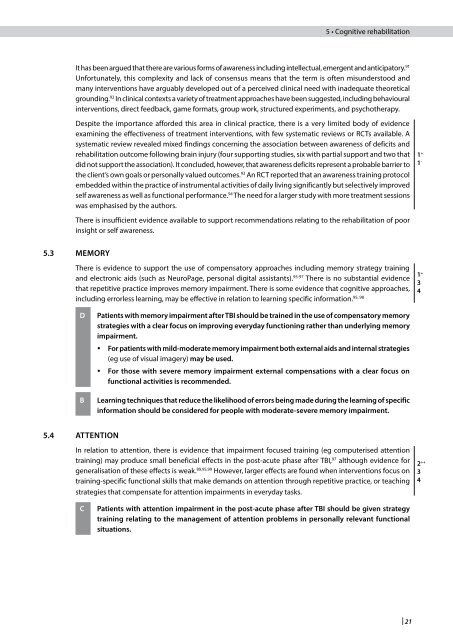sign130
sign130
sign130
Create successful ePaper yourself
Turn your PDF publications into a flip-book with our unique Google optimized e-Paper software.
It has been argued that there are various forms of awareness including intellectual, emergent and anticipatory. 91<br />
Unfortunately, this complexity and lack of consensus means that the term is often misunderstood and<br />
many interventions have arguably developed out of a perceived clinical need with inadequate theoretical<br />
grounding. 92 In clinical contexts a variety of treatment approaches have been suggested, including behavioural<br />
interventions, direct feedback, game formats, group work, structured experiments, and psychotherapy.<br />
Despite the importance afforded this area in clinical practice, there is a very limited body of evidence<br />
examining the effectiveness of treatment interventions, with few systematic reviews or RCTs available. A<br />
systematic review revealed mixed findings concerning the association between awareness of deficits and<br />
rehabilitation outcome following brain injury (four supporting studies, six with partial support and two that<br />
did not support the association). It concluded, however, that awareness deficits represent a probable barrier to<br />
the client’s own goals or personally valued outcomes. 93 An RCT reported that an awareness training protocol<br />
embedded within the practice of instrumental activities of daily living significantly but selectively improved<br />
self awareness as well as functional performance. 94 The need for a larger study with more treatment sessions<br />
was emphasised by the authors.<br />
There is insufficient evidence available to support recommendations relating to the rehabilitation of poor<br />
insight or self awareness.<br />
5.3 MEMoRy<br />
There is evidence to support the use of compensatory approaches including memory strategy training<br />
and electronic aids (such as NeuroPage, personal digital assistants). 95-97 There is no substantial evidence<br />
that repetitive practice improves memory impairment. There is some evidence that cognitive approaches,<br />
95, 98<br />
including errorless learning, may be effective in relation to learning specific information.<br />
D Patients with memory impairment after TBI should be trained in the use of compensatory memory<br />
strategies with a clear focus on improving everyday functioning rather than underlying memory<br />
impairment.<br />
y for patients with mild-moderate memory impairment both external aids and internal strategies<br />
(eg use of visual imagery) may be used.<br />
y for those with severe memory impairment external compensations with a clear focus on<br />
functional activities is recommended.<br />
B learning techniques that reduce the likelihood of errors being made during the learning of specific<br />
information should be considered for people with moderate-severe memory impairment.<br />
5.4 ATTENTIoN<br />
5 • Cognitive rehabilitation<br />
In relation to attention, there is evidence that impairment focused training (eg computerised attention<br />
training) may produce small beneficial effects in the post-acute phase after TBI, 97 although evidence for<br />
generalisation of these effects is weak. 89,95,99 However, larger effects are found when interventions focus on<br />
training-specific functional skills that make demands on attention through repetitive practice, or teaching<br />
strategies that compensate for attention impairments in everyday tasks.<br />
C Patients with attention impairment in the post-acute phase after TBI should be given strategy<br />
training relating to the management of attention problems in personally relevant functional<br />
situations.<br />
| 21<br />
1 +<br />
1 -<br />
1 +<br />
3<br />
4<br />
2 ++<br />
3<br />
4


